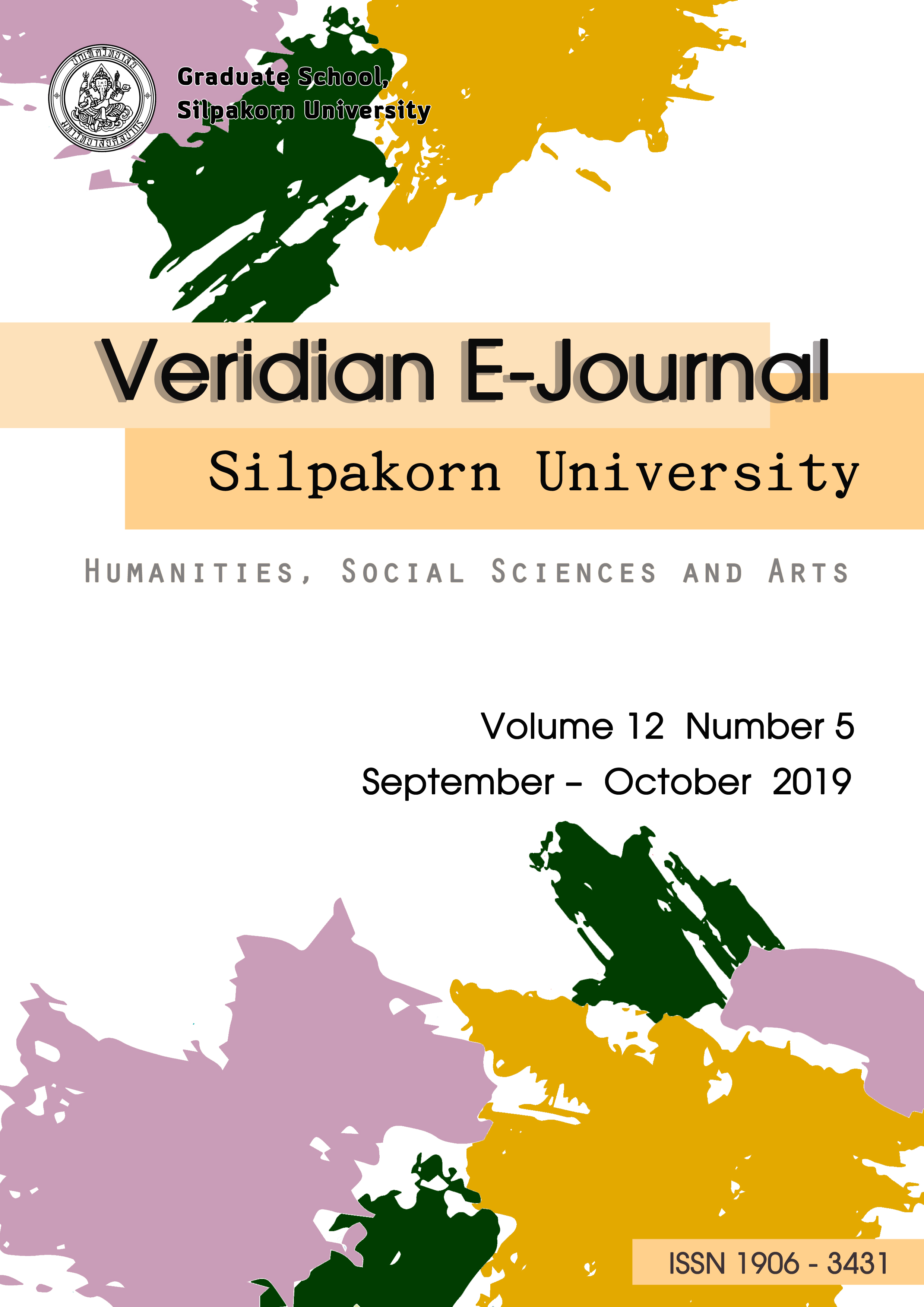กระบวนการจัดการองค์กรโขนสมัครเล่น (The Process of Amateur Khon Organization Management)
Main Article Content
บทคัดย่อ
บทความวิจัยนี้มีวัตถุประสงค์เพื่อศึกษากระบวนการจัดการองค์กรโขนสมัครเล่นในกรุงรัตนโกสินทร์ โดยศึกษาข้อมูลจากเอกสาร การสัมภาษณ์ การสังเกตการณ์ รวมทั้งจากประสบการณ์ของผู้วิจัย โดยคัดเลือกองค์กรโขนสมัครเล่น 3 แห่งเพื่อเป็นกรณีศึกษา คือ 1) โขนรามคำแหง เป็นกรณีศึกษาของโขนมหาวิทยาลัย 2) โขนสาธิตประสานมิตร เป็นกรณีศึกษาโขนโรงเรียน และ 3) โขนศูนย์วัฒนธรรม เป็นกรณีศึกษาโขนเอกชน ผลการศึกษาพบว่า องค์กรโขนสมัครเล่นทั้ง 3 เป็นองค์กรไม่แสวงหาผลกำไร มีครูจากสถาบันบัณฑิตพัฒนศิลป์เป็นผู้ฝึกสอน และ มีวัตถุประสงค์ใกล้เคียงกันคือ 1) เพื่อสร้างฐานผู้ชมโขน 2) เพื่อร่างกายที่แข็งแรง มีบุคลิกที่ดี และมีสมาธิ และ 3) เพื่อสร้างความสามัคคีและความสัมพันธ์อันดีในองค์กร แตกต่างกันที่เกณฑ์การรับนักเรียน โขนรามคำแหง และโขนศูนย์วัฒนธรรม เปิดรับนักเรียนจากทั้งภายในและภายนอกองค์กร และไม่จำกัดเพศ ส่วนโขนสาธิตประสานมิตรใส่ไว้ในหลักสูตรของนักเรียน ป.4 – 6 จะต้องเรียนทุกคน ทั้ง 3 ที่ได้รับทุนสนับสนุนจากต้นสังกัดของตัวเอง จึงเก็บค่าเรียนเพียงเล็กน้อย ยกเว้นโขนรามคำแหงที่ไม่เก็บเลย ทั้งหมดมีโครงสร้างองค์กรที่ไม่ซับซ้อนแต่ค่อนข้างมั่นคงจึงคงอยู่มาได้อย่างยาวนาน ปัจจัยสำคัญของการจัดการองค์กรโขนสมัครเล่นคือ1) ฝ่ายบริหาร ต้องมีนโยบายที่ส่งเสริมคณะโขนสมัครเล่น 2) เงินทุน ต้องมีเพียงพอสำหรับผู้เกี่ยวข้องทั้งหมด (Stakeholder) 3) ผู้เรียนหรือนักแสดงสมัครเล่น ต้องมีความสนใจเรียนและมีจำนวนที่เพียงพอ และ4) ครูผู้สอนโขน ต้องเข้าใจลักษณะของโขนสมัครเล่นและมีจิตสาธารณะ ปัจจัย 4 ข้อนี้หากขาดข้อใดไปจะทำให้องค์กรนั้นไม่สามารถดำเนินการอย่างยั่งยืนได้
This article aims to study the process of amateur Khon organization management in Rattanakosin period by studying information collected from documentation, interview, observation, including researcher’s experience by choosing three amateur Khon organizations as case studies; 1) Khon Ramkhamhaeng (troupe) as a case study for Khon in universities, 2) Satit Prasarnmitra Khon (troupe) as a case study for Khon in school, and 3) the Khon troupe of Cultural Center as the case study of private Khon troupe. The result of this study reveals that all of these three amateur Khon organizations are non-profitable organizations, consisted of Khon teachers from Bunditpatanasilpa Institute with similar purposes; 1) to create audience base 2) to strengthen physical ability, desirable personality and focus, and 3) to create organizational unity and positive relationship. The difference is their enrolment criteria. Khon Ramkhamhaeng and Khon of the Cultural Center are open to students from both inside, outside of their organizations with regardless of genders whereas Khon Satit Prasarnmitra installed Khon in their curriculum for students from grade four to six, which obliges every student to participate. All three organizations receive budget support from their executive institutions enabling them to collect minimal training fees, except Khon Ramkhamhaeng whose fee is exempted. All of them are consisted of noncomplex but rather solid structure, that enables them to have been continuing their operation for quite some length of time. The key factors of amateur Khon organization management are; 1) the administration must possess supporting policy for amateur Khon troupe, 2) there must be enough budget for all of involving parties (stakeholders), 3) for either students or amateur performers, there must possess adequate level in both participation and numbers of participants, and 4) Khon teachers are required to have understanding the nature of Khon amateurs and community-service mind. The lack of any of these four factors would bring about incapability of the organization to sustainably perform their operations.

